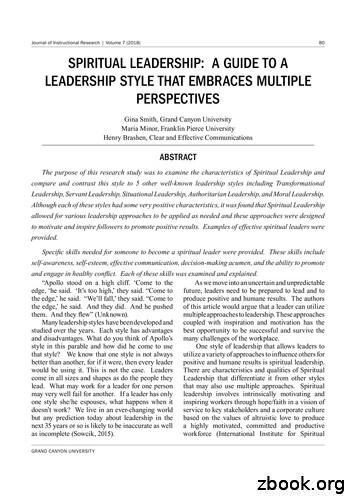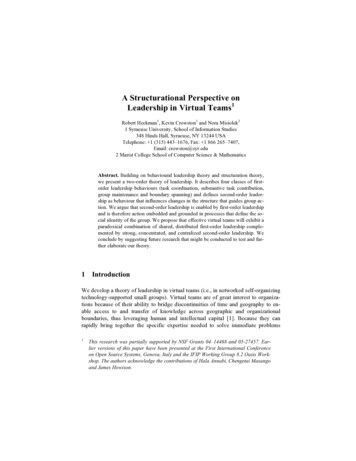Entrepreneurial Leadership And Its Effect On The Social-PDF Free Download
entrepreneurial mindset. Based on the researcher's observation, the management has been neglecting developing an entrepreneurial mindset through training to promote an entrepreneurial culture and mindset. Entrepreneurial culture or entrepreneurial environment provides a place where entrepreneurial mindset/spirit can be enhanced/developed.
entrepreneurial mindset as indispensable to the success of SMEs in Nigeria. Entrepreneurial competencies are skills, values, and attitudes that are well-thought-out necessary for the success of small and medium scale businesses. Entrepreneurial mindset refers to a specific state of mind which orientates human conduct towards
The definition of entrepreneurial mindset in this paper has been determined using a critical review of over 25 scholarly articles, and focuses on cognitive tendencies, intention, commitment, resilience and capability. Evidence suggests that entrepreneurial traits and behaviors have a correlated effect to successful entrepreneurial outcomes as .
Part A: Perspectives of Entrepreneurial Marketing 1. Entrepreneurship and Marketing Interface Research – A Synopsis and Evaluation Audrey Gilmore, Andrew McAuley, Damian Gallagher and David Carson 3 2. The Interrelationships Between Entrepreneurial Experience, Explanatory Style, Effectuation, and Entrepreneurial Self-Efficacy
A question within entrepreneurial education that never seems to go out of fashion is “Can entrepreneurship be taught?”. To address this question, this thesis adopts the view that becoming entrepreneurial requires direct experience, and explores how learning-by-doing can be put to use in entrepreneurial education through action-based approaches.
Entrepreneurial Mindset Assessment Reviews 01 Instrument Title Suggested Use, if noted Conceptual Framework, if any Factors / constructs assessed Reliability Validity Comments Availability Reviewer Entrepreneurial Self-Efficacy (ESE) Determining entrepreneurial tendency in college students and, possibly, those in the workforce Bandura, Self .
entrepreneurial process, which contributes to the entrepreneur's behaviour and performance (Clarysse & Van Boxstael, 2015; Murnieks et al., 2014). Passion is highly crucial in entrepreneurial context, considering that entrepreneurs must deal with challenges from the early phase of their business (Gielnik et al., 2015).
meet the needs of changing markets [5]. These types of engineering entrepreneurial skills have been shown to be teachable, yet assessment and evaluation of engineering entrepreneurial learning is an underdeveloped field of research [6]. In a literature review by Zappe [1], the definition of the term "entrepreneurial mindset" varied .
The goal of this course module is t o integrate the entrepreneurial mindset into thermodynamics, a core Mechanical Engineering course. So what exactly is th e entrepreneurial mindset then? Robert Kern 6, the founder of the Kern Family Foundation, explains the entrepreneurial mindset
Leadership, Servant Leadership, Situational Leadership, Authoritarian Leadership, and Moral Leadership. Although each of these styles had some very positive characteristics, it was found that Spiritual Leadership allowed for various leadership approaches to be applied as needed and these approaches were designed
The entrepreneurial ecosystem of South Africa: A strategy for global leadership South Africa is an entrepreneurial leader in sub-Saharan Africa. The country has made significant progress to overcome structural factors and produce some of the most innovative and successful enterprises on the continent.
PERSPECTIVE A dynamic capabilities-based entrepreneurial . especially in fast-moving global environ-ments. Entrepreneurial management and transformational leadership are . field of strategic .
(1) leadership in self-managing teams and shared leadership, informed by functional behavioral leadership theory, and (2) the emerging literature on leadership in virtual teams. These views of leadership depart from much of “traditional” leadership theory (e.g., trait theory, contingency and situational leadership theories, social exchange
marketing environment has made competition tougher for small and medium-size enterprises. (Olannye & Eromafuru, 2016). The need for an acceptable understanding of entrepreneurial marketing strategies and its applicability to entrepreneurial firms has gradually become an issue of pivotal concern to many scholars, entrepreneurs, and employees of .
The entrepreneurial mindset (EM) is a concept, which has been widely studied over the past decade [1]-[3]. The concept comes from the idea that in the world today people need to adopt entrepreneurial skills to better advance and develop society [4], [5]. EM has been integrated into
through a questionnaire that was applied to (250) individuals working in . (entrepreneurial culture, entrepreneurial leadership, creativity, etc.) (Bani Issa, 2020). . organizational creativity of medical and nursing staff at King Khaled Hospital. H02: There is a statistically significant effect of training strategy on the .
businesses invite innovation, create and provide new jobs, foster entrepreneurial spirit and creativity, and create competition that drives future business endeavors (Hillary, 2001). The pet dog industry is a salient example of entrepreneurial activity in which the
entrepreneurial learning initiative Process: The processes and methods that enable entrepreneurs to identify, evaluate, and transform ideas into mutually beneficial, sustainable endeavors. Person: The underlying motivation - the beliefs, assumptions, and psychological factors that drive entrepreneurial behavior.
2.2 Entrepreneurial Orientation and Access to Finance Entrepreneurial orientation and access to financial services is inter-related each other. Even lack of the previous literature identifies the direct relationship between them, however, without adequate resources, all strategic intentions and plans cannot be accomplished (Tang et
entrepreneurial mindset in line with the second school of thought, basing the mindset on the development of key competences, such as creativity, problem-solving, risk mitigation and . Spinelli and Adams (2016)'s definition of the mindset that encompasses the following entrepreneurial traits: a) Commitment and determination in terms of .
entrepreneurship and explain the process of entrepreneurial action. Y Entrepreneurial opportunities Those situations in which new goods, services, raw materials and organizing methods can be introduced and sold at greater than their cost of production. eation of new Figure 1.1 “Entrepreneurial Action” The McMullen-Shepherd model. M
to make a difference in foreign markets, companies need to adopt an entrepreneurial orientation (EO) by being innovative, proactive, and risk-taking in their decisions. Because emerging technologies are creating more fluidity and nonlinearity in entrepreneurial processes -20. 3#2).-With the advent of digital technologies, a new
mindset in these individuals along with a tactical focus on education and experience complemented by the personal traits of effort and ethics1. With the Allan Gray Orbis Foundation [s focus being on the development of an entrepreneurial mindset, they join many cutting edge entrepreneurial programmes .
388 ENTREPRENEURSHIP THEORY and PRACTICE. We also explore the relationship between entrepreneurial training and entrepreneurial self-efficacy for MBA students. Previous research indicates that one of the key aspects of self-efficacy across domains is that it not a static trait, but rather that it can be changed .
Entrepreneurial mindset confers lasting advantages to young people, including improved job prospects and earning potential, an increased likelihood of starting a business, and greater academic success. Entrepreneurial mindset is valued by employers. The benefits of entrepreneurial mindset for employment and earnings cannot be overstated.
entrepreneurial behavior at work, by investigating the role of job design variables. Drawing on multiple-source survey data of 179 workers in a Dutch research and consultancy organization we find that entrepreneurial behavior, indicated by innovation, proactivity and risk-taking items, is a higher-order construct. Job autonomy is positively
determinants, entrepreneurial performance, and impact. These three elements make sense as a starting point for ecosystem assessment. While there are a limited number of indicators for measuring impact and entrepreneurial performance, the number of potential determinants is fairly extensive. Finally, some of these
entrepreneurship due to four main reasons: I) it helps in solving the lack of specificity in previous research . personality as antecedents to entrepreneurial intent, this study was specifically interested in testing the . Among the many tasks that entrepreneurs perform; the most prominent and essential for the creation of
focused on “Defining the Entrepreneurial Spirit.” by introducing the “Amway Entrepreneurial Spirit Index”. We also found most entrepreneurs enjoy learning new things, want to enjoy life and like to be in charge. Fear of failure and a lack of confidence were also themes many hopeful entrepreneurs shared. Fortunately, many coun -
capable of guiding entrepreneurial activity by clearly defining how entrepreneurial the organisation wants to be, and, equally importantly, making employees, as the agents of change, aware of the strategy and willing to act accordingly. There has been a considerable amount of research on entrepreneurial behaviour
Resume Writing Personal Brand and Pitch Cover Letter Writing and Email Outreach Building a Target List . Categories of Entrepreneurial Interest MBA Career Management Start own venture at Wharton Longer term entrepreneurial
entrepreneurial intentions among graduates of Nigerian tertiary institutions. International Journal of Business and Management Invention, 2, 36-44. Akanbi, S. T. (2013). Familial Factors, Personality Traits and Self-Efficacy as Determinants of Entrepreneurial Intention among Vocational Based College Of
students towards entrepreneurship. For this purpose, we have designed several research steps. The study first presents the theoretical framework that includes a literature review of successful entrepreneur profiling and the influence of entrepreneurial role models on entrepreneurial intention and attitude towards entrepreneurship.
The greatest gains in mindset happened in classrooms with the highest growth in entrepreneurial learning, while the lowest mindset growth occurred in the lower-performing classrooms. Taken together, these findings indicate that EMI scores are meaningful and related to other areas associated with entrepreneurial thinking and behavior.
Entrepreneurial Mindset Many definitions of entrepreneurial mindset raise the concept of uncertainty such as the ability to sense, act, and mobilise under uncertain conditions ûMcGrath & MacMillan, 2000, p. 15 ü, ways of thinking about business that focuses on and captures benefits of uncertainty ûIreland et al., 2003, p.
A COMPARATIVE STUDY OF TERTIARY STUDENT’S ENTREPRENEURIAL INTENTION: INDONESIA AND TAIWAN Dedi Purwana, Universitas Negeri Jakarta Andi Muhammad Sadat, Universitas Negeri Jakarta Agus Wibowo, Universitas Negeri Jakarta ABSTRACT This research is a comparative study on entrepreneurial intentions of tertiary students in
Artist Entrepreneurial Grants recognize the importance of the creative workforce to New Hampshire’s economy. Artist Entrepreneurial Grants support opportunities that will benefit artists’ careers and small businesses, including the development of business skills
The final list of 33 papers contained 3 articles not focusing on the entrepreneurial mindset but on the mindset per se (Gollwitzer, 1990; Gollwitzer, Heckhausen, & Stel-ler, 1990; Gollwitzer & Kinney, 1989). As these papers formed a relevant basis for the conceptualisation of the entrepreneurial mindset later on by McMullen and Kier
an entrepreneurial mindset. [1] During the workshop, the authors developed a set of learning modules focused using KEEN's model. The student must deliver a presentation and a written report focused on the entrepreneurial mindset for a digital communication course, identified as EE 463.
ELI is a leader in entrepreneurial mindset training The Entrepreneurial Mindset Training Course is based on the Ice House Entrepreneurship Program, which was developed from hundreds of in-depth interviews with non-Silicon Valley entrepreneurs (funded by CISCO Systems' Entrepreneurship Institute and the Ewing Marion Kauffman Foundation)







































